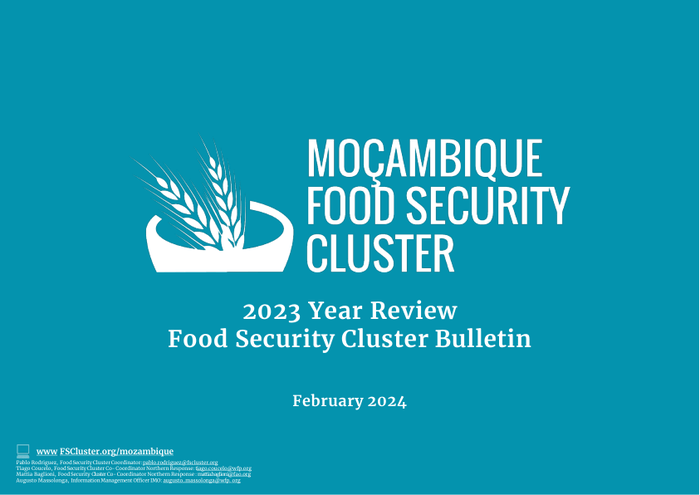
HRP 2023 (Conflict in the northern Region)
The conflict in Northern Mozambique, particularly in Cabo Delgado, has undergone significant shifts and challenges, impacting the region’s stability and food security. In 2023, the government, with international support, reclaimed control over northeastern districts previously dominated by non-state armed groups (NSAGs), resulting in a decrease in attacks against civilians and improved humanitarian access. However, pockets of volatility persisted, with NSAGs adapting tactics and targeting security forces while engaging in trade to gain community acceptance.
The conflict’s toll on civilians has been severe, with over 109,000 people displaced in 2023, primarily during military operations, resulting in casualties and destruction of homes. While there was a decrease in internally displaced persons (IDPs) by August 2023, significant challenges persisted, with vulnerable populations enduring violence, displacement, and food insecurity.
Displacement patterns evolved, with shorter distances travelled, but vulnerabilities remained, particularly among IDPs and returnees. Returnees faced inadequate services and infrastructure, prompting pendular movements between areas of return and displacement sites to access necessities and livelihood opportunities developed during displacement.
Food insecurity exacerbated the crisis, affecting IDPs, host communities, and returnees alike. The Integrated Food Security Phase Classification (IPC) projected a rise in acute food insecurity from 2.6 million to 3.3 million people between October 2023 and March 2024, with Cabo Delgado experiencing a significant proportion of those in IPC Phase3+, including the districts of Meluco and Macomia in IPC 4 (emergency level).
Limited land tenure rights, especially for IDPs, worsened food and nutrition security, as scant food production failed to meet needs. Host communities also struggled to produce enough food, compounding assistance requirements. The conflict disrupted agricultural activities and livelihoods, leading to widespread displacement and hindering access to essential resources for food production.
Efforts to address food security challenges included humanitarian assistance and government programs aimed at fostering time-sensitive emergency agricultural interventions and livelihood-support activities. Partners assisted the affected population with food aid, livelihood, agriculture, and fisheries equipment and training session that also consider climate-related challenges. However, limited resources, the ongoing violence, restricted land access, and limited infrastructure hampered sustainable solutions.
Cluster coordination functions remained critical amidst increased humanitarian needs, including those exacerbated by climatic shocks and conflict-affected areas. Collaborative efforts between humanitarian organizations and the Mozambican government were essential in addressing the multifaceted challenges of the crisis. Despite efforts to mitigate the crisis, ongoing violence, displacement, and limited access to resources continue to threaten the well-being and stability of affected populations. Sustainable solutions require coordinated action, long-term investments, and a comprehensive approach to address the root causes of the conflict and its impact on food security.
Non-HRP response by FSC in 2023 (addendum HRP)
The impact of natural disasters, particularly cyclones and droughts, has compounded existing challenges in Mozambique, exacerbating food insecurity, displacement, and infrastructure damage.
Tropical Cyclone Freddy, a record-breaking storm in 2023, struck Mozambique twice, causing destructive winds, extreme rainfall, and widespread flooding. Despite accurate early warnings, significant damage occurred, affecting infrastructure, displacing populations, and disrupting essential services. The storm worsened existing flooding and exacerbated the cholera outbreak, leading to increased vulnerabilities and humanitarian needs. Over 774,000 people were at risk during the 2023/2024 rainy season, necessitating preparedness efforts and humanitarian action.
Drought, another significant concern, has been increasing in frequency, particularly in southern areas of the country. The 2023/2024 rainy season forecast predicts below average rainfall in southern and central Mozambique due to the El Niño effect, posing risks to agriculture-dependent populations. Over 565,000 people are at risk of severe drought in Inhambane and Gaza provinces, exacerbating food insecurity, malnutrition, and migration.
The compounding effect of cholera outbreaks, floods, and cyclones, alongside the ongoing conflict in northern Mozambique, has stretched humanitarian responses across the country. Cyclone Freddy displaced over 184,000 people and destroyed over 129,000 homes, highlighting the urgent need for critical humanitarian assistance and protection measures. The Humanitarian Response Plan (HRP) Addendum for Freddy, Floods, and Cholera outlines priorities to prevent loss of life, provide life-sustaining assistance, and address protection risks for affected populations.
In summary, the intersection of natural disasters and ongoing crises in Mozambique’s population amidst evolving climate challenges and conflict dynamics. underscores the importance of coordinated and timely humanitarian responses to mitigate the impact on vulnerable communities. Addressing the immediate needs while investing in long-term resilience and adaptation measures are crucial to safeguarding the well-being and livelihoods of Mozambique.
